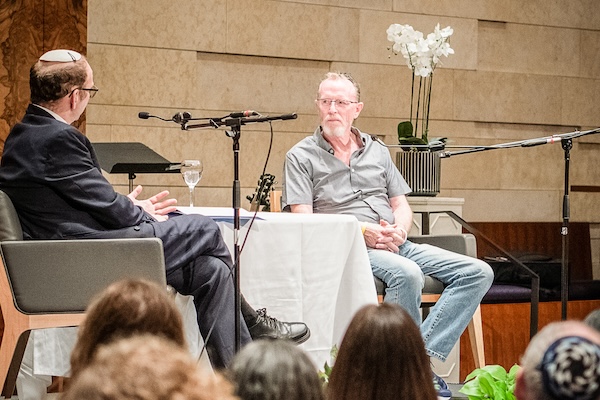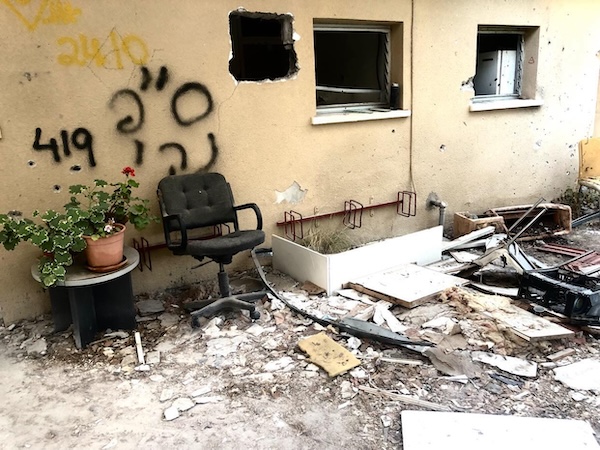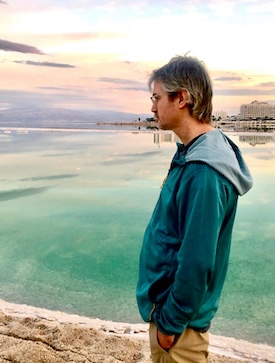Thomas Hand and the survivors of the massacre at Kibbutz Be’eri hope to return home in 2026. (photo by Gil Zohar)
Kibbutz Hatzerim, eight kilometres west of Be’er Sheva, best known for its drip-irrigation plant, also houses the newly established quarter here for the survivors of Hamas’s Oct. 7, 2023, massacre of more than 130 of Kibbutz Be’eri’s 1,071 residents. Emily Hand and her Dublin-born father Thomas, 64, are among the 200 refugees living there. In 2026, they hope to move back to rebuilt homes in their community alongside the Gaza Strip.
“We’re still in the stage of demolishing the houses beyond repair,” Hand said. A quarter of Be’eri’s housing is unsalvageable.
Some vegetation has been planted around the new temporary bungalows at Hatzerim, and the site is beginning to resemble a kibbutz neighbourhood. But little else is normal.
The Hands marked the anniversary of Emily’s release from imprisonment in the tunnels of Gaza on Nov. 26. A week earlier, the Irish-Israeli celebrated her 10th birthday. Thomas no longer allows his daughter to be interviewed by the media. The probing questions she faced raised horrific memories of captivity that she is still struggling to process, said her father. She has engaged in various therapies, including seeing a psychologist weekly, horse riding and puppy love with their pooch, Johnsey.
“She’s living day to day, enjoying every day,” her father said.
The Hands moved to their home at Hatzerim shortly before Rosh Hashanah and Emily started the new school year there. Before then, they had been sheltered at Kibbutz Ein Gedi’s hotel by the Dead Sea.
Like his daughter, Hand too is struggling. In the days after Oct. 7, he was initially informed his daughter had been murdered. After a month, that assessment was revised to missing. After more uncertainty, she was then declared a hostage – and finally released in a swap for Hamas gunmen and other terrorists.
The Hand household is still decorated with balloons from Emily’s recent birthday party. Among the guests were fellow hostages Noa Argamani, Ra’aya Rotem and Hila Rotem Shoshani, who surprised Emily with a cake and candles. Argamani, who was imprisoned with Hand, was rescued on June 8, after 245 days in captivity, in a joint operation by the Israel Defence Forces, Shabak (Israel’s security agency) and Israel Police.
Hand said Emily is adjusting “incredibly well.” But then he contextualized what that means: “She still sleeps with me. Usually in my bed.”
“She was captured from a MaMaD [safe room]. And that’s a trigger,” he said.
The constant roar of jets flying overhead to and from the nearby Hatzerim Air Base adds to their ill-ease. Hand’s conversation is punctuated by sighs and tears. “Don’t mind me,” he said. “It’s just part of the process.”
None of the kibbutz’s protected spaces had bulletproof doors, he noted. His own MaMaD wasn’t equipped with a lock, he added. “I just had to hope and pray.”
Other general tactical mistakes included storing the kibbutz’s guns and ammo in a central location rather than having them distributed among people’s homes. Half the members of Be’eri’s emergency response team were gunned down trying to reach the armoury, Hand said.
His first concern on Oct. 7 was for Emily, who was sleeping over at a friend’s house 300 metres away. With bullets flying, there was no chance to run there to attempt to rescue her, he recalled.
He left his shelter at 10 a.m. Armed with his pistol, two magazine clips and a bullet in the chamber, he positioned himself by his kitchen window, which offered a wide field of fire. The Hand family house was relatively untouched apart from shrapnel damage.
“While I couldn’t protect my daughter, I was able to protect three houses,” he said.
Hand remained at his post until 11:30 p.m., when IDF soldiers arrived.
“The amount of guilt that I felt at not going to save her [Emily] even at the risk of my own life…. But I knew I would be dead, and she would be an orphan. It was a very big thing afterwards. At the time, I was just in survival mode.”
With self-deprecating humour, Hand remembered he only had two cans of beer in the fridge that Saturday morning. It’s a mistake he has never repeated, he said, now always having a case of suds on hand.
Another cause of guilt is not being able to work. He had previously been employed at Be’eri’s printshop, and then as a painter at its toy and furniture factory. While the workshop has reopened, Hand is unable to commute the 90 minutes there, since he must stay close to his daughter. “I have to keep her normalized,” he said.
“They’ve given me a lot of leeway,” Hand said of the kibbutz secretariat. In the meantime, he devotes a lot of time to hostage issues.
Looking wistful, he concluded: “I will not feel safe going back to Be’eri with this government in power, and without Hamas being completely crushed.”
Gil Zohar is a writer and tour guide in Jerusalem.




